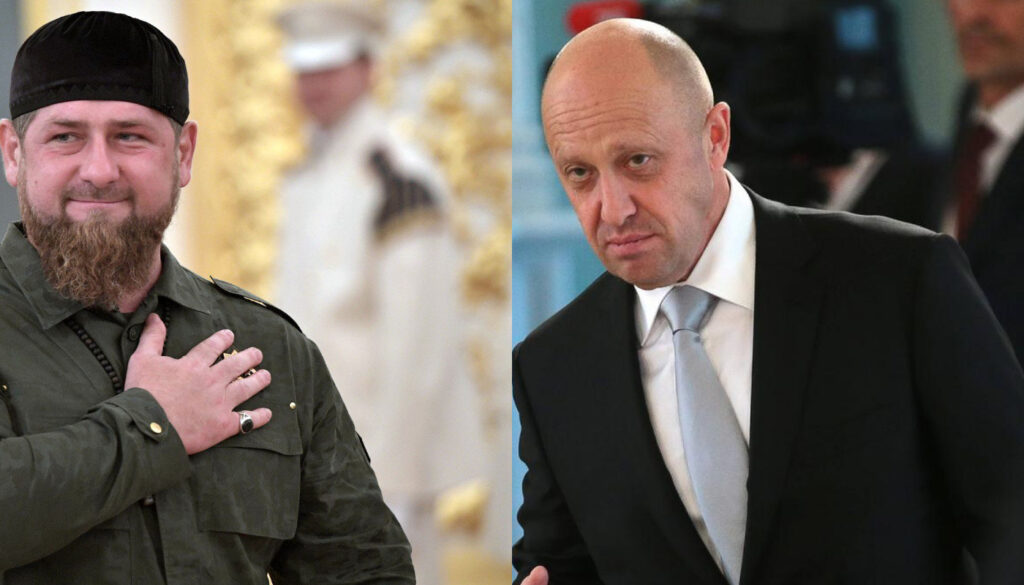
Ramzan Kadyrov has claimed the possible transfer of units under his control to Bakhmut from other parts of the front, probably to support Yevgeny Prigozhin’s blackmail of the Russian military command to allocate ammunition to the Wagner PMC mercenaries.
Earlier it became known that the Chief of the Russian General Staff, Valery Gerasimov, conceded to the demands of individual unit commanders. In this regard, experts of the Institute for the Study of War (ISW) doubt Russia’s ability to carry out a coordinated defensive campaign along the entire front line.
As noted in the report, Kadyrov published an appeal to Vladimir Putin on May 6, asking him to order Defense Minister Sergei Shoygu and Rosgvardiya head Viktor Zolotov to move Chechen Akhmat units from “other directions” to Wagner’s positions in the Bakhmut direction.
Obviously, such an operation would lead to a weakening of the Russian defensive lines in the areas where Kadyrov’s forces are standing, which Gerasimov and Shoigu or Putin could not do.
ISW notes that Akhmat units had previously been spotted in the area of Bilohovka on the Svatove–Kreminna line and in Zaporizhzhia Oblast. Their withdrawal from these positions could undermine Russian defensive efforts before a Ukrainian counterattack.
The institute believes that Shoigu and Gerasimov, personally loyal to Putin, could have allocated ammunition to Wagner on his instructions.
“Clearly, the successful joint blackmail efforts of Kadyrov and Prigozhin indicate that Gerasimov does not actually control all Russian troops in Ukraine, despite the fact that he is the nominal commander of the entire theater of operations. Gerasimov probably tried to take control of all Russian irregular forces in the winter of 2023, but failed even before he lost Putin’s favor in the spring”.
Kadyrov probably supported Prigozhin’s efforts to blackmail the Russian military command in order to restore his importance to the Kremlin. Earlier, Kadyrov had lost Putin’s favor because his forces played a minor role in active combat operations in Ukraine in the fall of 2022 and the winter of 2023. Putin humiliated Kadyrov during their March 13 meeting, where Kadyrov was visibly nervous when reporting on the role of Chechen fighters in Ukraine. Kadyrov probably took Prigozhin’s threats to withdraw troops from Bakhmut as an opportunity to demonstrate the effectiveness of his forces amid Gerasimov and Shoygu’s inability to score decisive victories during the winter-spring offensive, ISW believes.
ISW believes that Gerasimov’s forced need to negotiate with Prigozhin and Kadyrov indicates problems in the chain of command in the Russian army, which will affect its ability to resist a Ukrainian counteroffensive
“Gerasimov’s need to negotiate with subordinate commanders and the ability of those commanders to pressure him indicates that problems in the chain of command significantly affect the Russian military’s ability to conduct coordinated theater-wide operations. The position of commander-in-chief should in principle allow Gerasimov to command any Russian unit or ground force commander in Ukraine, even those leading irregular formations such as Wagner and Akhmat.
Prigozhin and Kadyrov seem capable of making largely independent decisions in
with their forces, but this phenomenon becomes all the more noticeable the longer these forces have had de facto control over certain parts of the front.
All of these factors call into question Russia’s ability to mount a coordinated, concerted defense campaign throughout the theater. Russian military commanders appear to be increasingly delegating responsibility for different sections of the front in Ukraine to different Russian commanders. Meanwhile, the authority of the commander of the entire theater continues to diminish. Gerasimov’s diminished ability to control his commanders is likely to further limit the Russian military’s ability to conduct coordinated operations covering different areas of responsibility.
